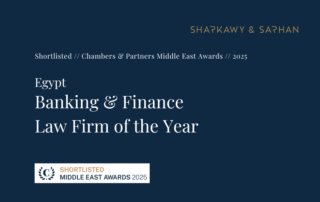28th of May, 2018
Opportunities for SMEs
Egypt is currently witnessing significant legislative reform, aimed at enhancing the investment environment and encouraging both local and foreign investments. SMEs, which constitute more than 70% of the economy across different sectors, is one of the main pillars of the Egyptian economy. Accordingly, it is not a surprise that the Egyptian government is prioritizing addressing the needs of such key players through legislative reforms.
New Investment Law: Specific Incentives for SMEs
When incorporating your company, if its activities fall under one or more of the thirteen sectors identified under the Executive Regulations to the New Investment Law, then you would be subject to the New Investment Law (72/2017), and would thus benefit from all general incentives and guarantees stated within it.
In addition, the New Investment Law explicitly addresses SMEs, including them under sector (B) for obtaining specific incentives. This allows for deductions from taxable net profits constituting a 30% discount off investment costs.
SMEs: Finance Opportunities
Perhaps the most prominent governmental initiative addressing the financing needs of SMEs is the CBE initiative aiming to increase SME financing opportunities, offering low-interest rates, and increasing financial inclusion more generally. Initially launched in 2008 as a scheme that offered incentives to banks for lending to SMEs, it has evolved over the last ten years. It currently makes it mandatory for registered banks in Egypt to allocate a minimum of 20% of their loan and credit portfolio by the end of 2019 to financing SMEs.
Since one of the key issues yet to be developed in Egypt’s legislative environment for SMEs is the adopting of a unified definition or criteria for what constitutes an SME, we must point out that when we refer to SMEs in this context, we are adopting the final amended definition of the CBE. According to this, a small entity is one that has an annual business turnover of a minimum of one million and a maximum of fifty million EGP, while a medium-sized entity is one with an annual business turnover of a minimum of fifty million and maximum two hundred million EGP.
If your business size is in accordance with the above criteria then your chances of getting a loan from a bank will be enhanced, as you will then be falling under the 20% obligation. Remarkably, that is not even good news. In addition to the above, banks are incentivized to grant loans at a maximum interest rate of 5% simple diminishing return for small entities. Furthermore, for medium-sized entities, the CBE has allocated a total of 15 billion EGP to be offered through banks in Egypt with discounted interest rates (long-term loans at 7% and short term financial facilities for working capital at 12%). These loans are offered according to a specific set of requirements, focusing on specific sectors, in particular the industrial and agricultural sectors.
Additional important financing opportunities are offered to SMEs through the Micro, Small and Medium Enterprises Development Agency (MSME Development Agency). Loans range from 10,000 EGP to five million EGP, mainly directed to small entities (with a minimum paid capital of 50,000 EGP and a maximum of one million EGP). These are available either directly through the MSME, or through a list of banks which collaborate with the MSME, as announced on their official website. Qualifications, requirements, and guarantees to obtain these loans are tailored to fit the nature of SME business models.
For further information check out the MSME website: http://www.msme.eg/ar/Pages/default.aspx
These are just examples of many tailored opportunities available for SMEs. In a developing legal environment such as Egypt, as a founder or business owner, you should always keep yourself posted on the changing legal environment so as not to miss emerging opportunities.
New Investment Law: Specific Incentives for SMEs
When incorporating your company, if its activities fall under one or more of the thirteen sectors identified under the Executive Regulations to the New Investment Law, then you would be subject to the New Investment Law (72/2017), and would thus benefit from all general incentives and guarantees stated within it.
In addition, the New Investment Law explicitly addresses SMEs, including them under sector (B) for obtaining specific incentives. This allows for deductions from taxable net profits constituting a 30% discount off investment costs.
SMEs: Finance Opportunities
Perhaps the most prominent governmental initiative addressing the financing needs of SMEs is the CBE initiative aiming to increase SME financing opportunities, offering low-interest rates, and increasing financial inclusion more generally. Initially launched in 2008 as a scheme that offered incentives to banks for lending to SMEs, it has evolved over the last ten years. It currently makes it mandatory for registered banks in Egypt to allocate a minimum of 20% of their loan and credit portfolio by the end of 2019 to financing SMEs.
Since one of the key issues yet to be developed in Egypt’s legislative environment for SMEs is the adopting of a unified definition or criteria for what constitutes an SME, we must point out that when we refer to SMEs in this context, we are adopting the final amended definition of the CBE. According to this, a small entity is one that has an annual business turnover of a minimum of one million and a maximum of fifty million EGP, while a medium-sized entity is one with an annual business turnover of a minimum of fifty million and maximum two hundred million EGP.
If your business size is in accordance with the above criteria then your chances of getting a loan from a bank will be enhanced, as you will then be falling under the 20% obligation. Remarkably, that is not even good news. In addition to the above, banks are incentivized to grant loans at a maximum interest rate of 5% simple diminishing return for small entities. Furthermore, for medium-sized entities, the CBE has allocated a total of 15 billion EGP to be offered through banks in Egypt with discounted interest rates (long-term loans at 7% and short term financial facilities for working capital at 12%). These loans are offered according to a specific set of requirements, focusing on specific sectors, in particular the industrial and agricultural sectors.
Additional important financing opportunities are offered to SMEs through the Micro, Small and Medium Enterprises Development Agency (MSME Development Agency). Loans range from 10,000 EGP to five million EGP, mainly directed to small entities (with a minimum paid capital of 50,000 EGP and a maximum of one million EGP). These are available either directly through the MSME, or through a list of banks which collaborate with the MSME, as announced on their official website. Qualifications, requirements, and guarantees to obtain these loans are tailored to fit the nature of SME business models.
For further information check out the MSME website: http://www.msme.eg/ar/Pages/default.aspx
These are just examples of many tailored opportunities available for SMEs. In a developing legal environment such as Egypt, as a founder or business owner, you should always keep yourself posted on the changing legal environment so as not to miss emerging opportunities.

Opportunities for SMEs
28 May, 2018
Egypt is currently witnessing significant legislative reform, aimed at enhancing the investment environment and encouraging both local and foreign investments. SMEs, which constitute more than 70% of the economy across different sectors, is one of the main pillars of the Egyptian economy. Accordingly, it is not a surprise that the Egyptian government is prioritizing addressing the needs of such key players through legislative reforms.
New Investment Law: Specific Incentives for SMEs
When incorporating your company, if its activities fall under one or more of the thirteen sectors identified under the Executive Regulations to the New Investment Law, then you would be subject to the New Investment Law (72/2017), and would thus benefit from all general incentives and guarantees stated within it.
In addition, the New Investment Law explicitly addresses SMEs, including them under sector (B) for obtaining specific incentives. This allows for deductions from taxable net profits constituting a 30% discount off investment costs.
SMEs: Finance Opportunities
Perhaps the most prominent governmental initiative addressing the financing needs of SMEs is the CBE initiative aiming to increase SME financing opportunities, offering low-interest rates, and increasing financial inclusion more generally. Initially launched in 2008 as a scheme that offered incentives to banks for lending to SMEs, it has evolved over the last ten years. It currently makes it mandatory for registered banks in Egypt to allocate a minimum of 20% of their loan and credit portfolio by the end of 2019 to financing SMEs.
Since one of the key issues yet to be developed in Egypt’s legislative environment for SMEs is the adopting of a unified definition or criteria for what constitutes an SME, we must point out that when we refer to SMEs in this context, we are adopting the final amended definition of the CBE. According to this, a small entity is one that has an annual business turnover of a minimum of one million and a maximum of fifty million EGP, while a medium-sized entity is one with an annual business turnover of a minimum of fifty million and maximum two hundred million EGP.
If your business size is in accordance with the above criteria then your chances of getting a loan from a bank will be enhanced, as you will then be falling under the 20% obligation. Remarkably, that is not even good news. In addition to the above, banks are incentivized to grant loans at a maximum interest rate of 5% simple diminishing return for small entities. Furthermore, for medium-sized entities, the CBE has allocated a total of 15 billion EGP to be offered through banks in Egypt with discounted interest rates (long-term loans at 7% and short term financial facilities for working capital at 12%). These loans are offered according to a specific set of requirements, focusing on specific sectors, in particular the industrial and agricultural sectors.
Additional important financing opportunities are offered to SMEs through the Micro, Small and Medium Enterprises Development Agency (MSME Development Agency). Loans range from 10,000 EGP to five million EGP, mainly directed to small entities (with a minimum paid capital of 50,000 EGP and a maximum of one million EGP). These are available either directly through the MSME, or through a list of banks which collaborate with the MSME, as announced on their official website. Qualifications, requirements, and guarantees to obtain these loans are tailored to fit the nature of SME business models.
For further information check out the MSME website: http://www.msme.eg/ar/Pages/default.aspx
These are just examples of many tailored opportunities available for SMEs. In a developing legal environment such as Egypt, as a founder or business owner, you should always keep yourself posted on the changing legal environment so as not to miss emerging opportunities.
New Investment Law: Specific Incentives for SMEs
When incorporating your company, if its activities fall under one or more of the thirteen sectors identified under the Executive Regulations to the New Investment Law, then you would be subject to the New Investment Law (72/2017), and would thus benefit from all general incentives and guarantees stated within it.
In addition, the New Investment Law explicitly addresses SMEs, including them under sector (B) for obtaining specific incentives. This allows for deductions from taxable net profits constituting a 30% discount off investment costs.
SMEs: Finance Opportunities
Perhaps the most prominent governmental initiative addressing the financing needs of SMEs is the CBE initiative aiming to increase SME financing opportunities, offering low-interest rates, and increasing financial inclusion more generally. Initially launched in 2008 as a scheme that offered incentives to banks for lending to SMEs, it has evolved over the last ten years. It currently makes it mandatory for registered banks in Egypt to allocate a minimum of 20% of their loan and credit portfolio by the end of 2019 to financing SMEs.
Since one of the key issues yet to be developed in Egypt’s legislative environment for SMEs is the adopting of a unified definition or criteria for what constitutes an SME, we must point out that when we refer to SMEs in this context, we are adopting the final amended definition of the CBE. According to this, a small entity is one that has an annual business turnover of a minimum of one million and a maximum of fifty million EGP, while a medium-sized entity is one with an annual business turnover of a minimum of fifty million and maximum two hundred million EGP.
If your business size is in accordance with the above criteria then your chances of getting a loan from a bank will be enhanced, as you will then be falling under the 20% obligation. Remarkably, that is not even good news. In addition to the above, banks are incentivized to grant loans at a maximum interest rate of 5% simple diminishing return for small entities. Furthermore, for medium-sized entities, the CBE has allocated a total of 15 billion EGP to be offered through banks in Egypt with discounted interest rates (long-term loans at 7% and short term financial facilities for working capital at 12%). These loans are offered according to a specific set of requirements, focusing on specific sectors, in particular the industrial and agricultural sectors.
Additional important financing opportunities are offered to SMEs through the Micro, Small and Medium Enterprises Development Agency (MSME Development Agency). Loans range from 10,000 EGP to five million EGP, mainly directed to small entities (with a minimum paid capital of 50,000 EGP and a maximum of one million EGP). These are available either directly through the MSME, or through a list of banks which collaborate with the MSME, as announced on their official website. Qualifications, requirements, and guarantees to obtain these loans are tailored to fit the nature of SME business models.
For further information check out the MSME website: http://www.msme.eg/ar/Pages/default.aspx
These are just examples of many tailored opportunities available for SMEs. In a developing legal environment such as Egypt, as a founder or business owner, you should always keep yourself posted on the changing legal environment so as not to miss emerging opportunities.
Insights
Disclaimer
The information included in this publication/client alert is not legal advice or any other advice. Publications and client alerts on this site are current as of their date of publication and do not necessarily reflect the present law or regulations. Please feel free to contact us should you need any legal advice related to the publication/client alert. Sharkawy & Sarhan (the “Firm”) will not be held liable for any compensatory, special, direct, incidental, indirect, or consequential damages, exemplary damages or any damages whatsoever arising out of or in connection with the use of the data, information or material included in this publication/client alert. This publication/client alert may contain links to third-party websites that are not controlled by the Firm. These third-party links are made available to you as a convenience and you agree to use these links at your own risk. Please be aware that the Firm is not responsible for the content or services offered by and of third-party websites, links as included in the Newsletter nor are we responsible for the privacy policy or practices of third-party websites links included therein.
Authorization of Use
The data, information, and material included in this publication/client alert are solely owned by the Firm. All rights related are reserved under the laws of the Arab Republic of Egypt. No part of this publication/client alert can be redistributed, copied, or reproduced without the prior written consent of the Firm.








